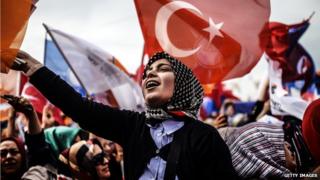Turkey’s women struggle for equality
Turkey is gearing up for a general election on 7 June and women are pushing to make gender equality an issue.
Activists are calling for more female participation in politics and working life.
Only 14% of all MPs in the last parliament were women, and almost half of Turkey’s cities have no female representation.
Only 28% of Turkish women participate in the workforce, compared with the European Union average of 63%.
Meanwhile Turkey ranks 125 out of 140 countries in the Global Gender Gap Index 2014, published by the World Economic Forum.
And in recent months, the country has been shaken by news of women being murdered, prompting calls to do more to tackle gender-based violence.
‘Dragging their feet’
More than 100 women have been killed by men in Turkey since the beginning of this year, local media report. Figures show that the murders of women have been rising for the last three years.
The rise in murders is also symptomatic of a wider problem with domestic and sexual violence.
Turkey made no progress in reducing domestic violence between 2008 and 2014, according to the Domestic Violence Against Women Report 2014 (in Turkish).
The report said almost 40% of women in Turkey had been physically abused at least once in their lifetime. One in 10 had been also subjected to sexual violence by their partner, it added.
Gulsum Kav, from the campaign group We Will Stop Murders of Women, says that politicians – overwhelmingly male – are dragging their feet on pressing issues.
“The laws to protect women are in place but they are not implemented,” she told the BBC.
“Police and the judiciary are resisting and there is no real political will in Turkey to put pressure on them.”
Headscarves and opportunities
Recent statements made by leading male politicians have also raised doubts about their commitment to improving women’s rights in Turkey.
President Recep Tayyip Erdogan sparked anger last year when he said “women and men are not equal”. Health Minister Mehmet Muezzinoglu also suggested that the best career option for women was motherhood.
Meanwhile, the debate about Muslim headscarves has long been a touchstone for women’s rights in Turkey.
Some argue that the government’s lifting of a ban on wearing headscarves in state institutions in 2013 has given women more freedom.
Leyla Sahin Usta, who wears a headscarf and is running for parliament for the ruling Justice and Development Party (AKP), says the move changed her life.
“I was kicked out of the medical school because of my headscarf and could only complete my studies abroad. After the ban was lifted, women with headscarves were reborn,” she said.
“We became equal with other women in Turkey and have the same employment opportunities.”
More women in politics
Activists say having more women in politics would help resolve many of the questions around gender equality.
“In a country like Turkey where women face many problems, it is essential that they have strong representation in parliament to address the inequalities they suffer on a daily basis,” Gonul Kahraman, chair of the Association for Support of Women Candidates (KA-DER), told the BBC.
KA-DER predicts that women’s representation could increase to around 18% in the next parliament, which it says is far from adequate.
Filiz Kerestecioglu, a parliamentary candidate with the pro-Kurdish, leftist People’s Democratic Party, says Turkey has seen enough of male politics and she wants to become an MP to ensure that laws to protect women are implemented effectively.
“The current political discourse is encouraging men to be violent against women,” she says.
“It would be impossible to eradicate the dominant mindset instantly, but I believe we will have bigger gains if there are more women in the assembly.”
BBC Monitoring reports and analyses news from TV, radio, web and print media around the world. You can follow BBC Monitoring on Twitter and Facebook.
Source: Read Full Article



